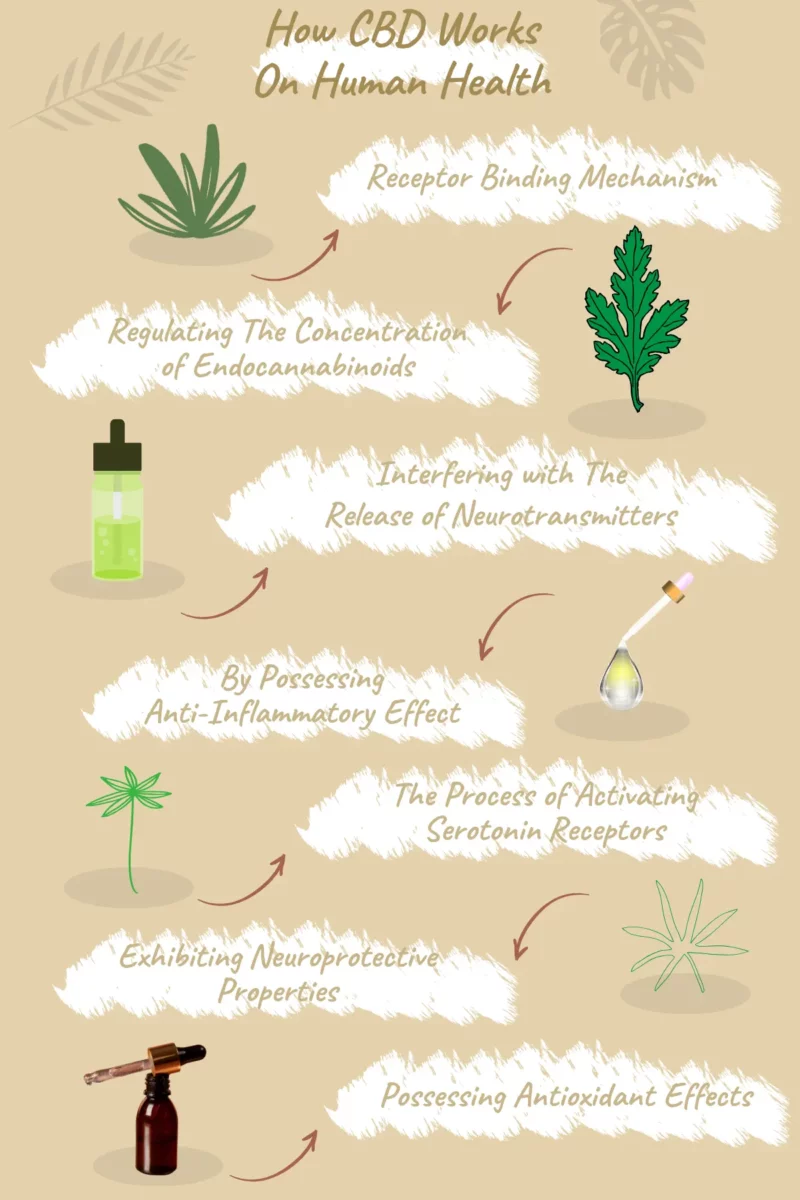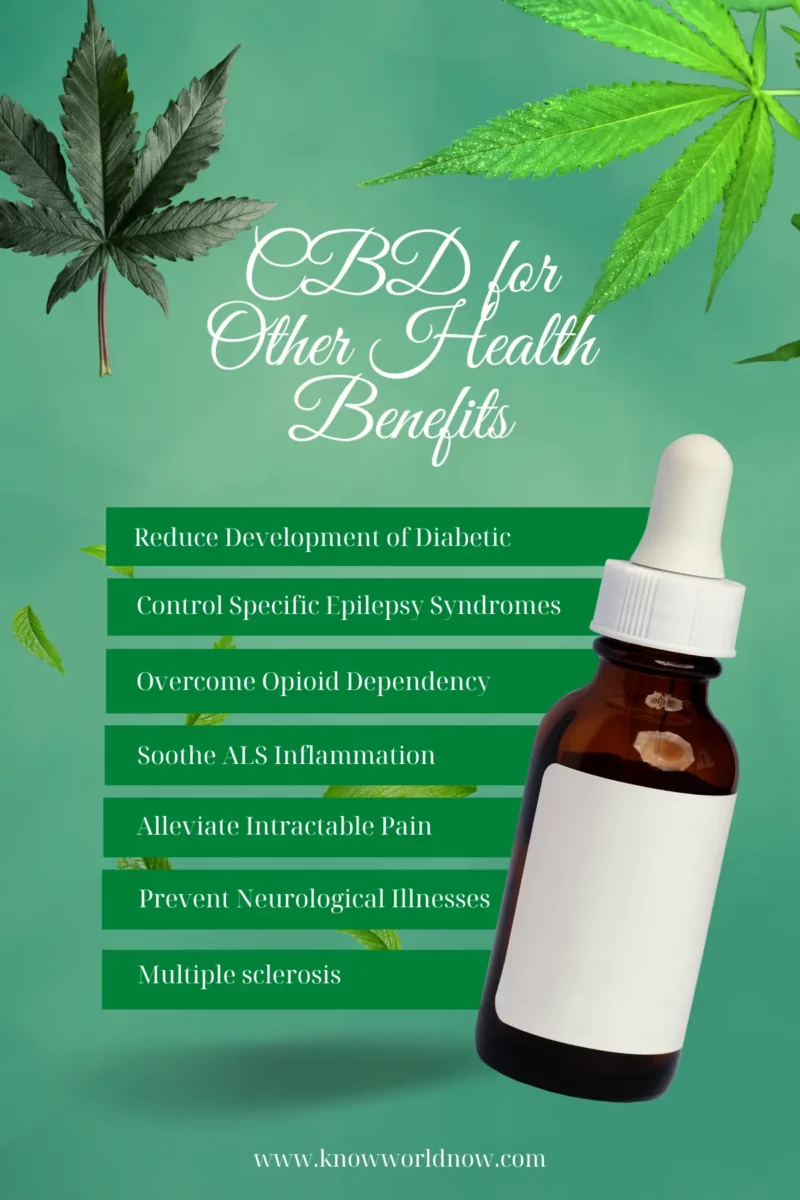Are CBD Products Worth Using for Health and Wellbeing? The most trending question in recent years!!!
The claims that cannabidiol (CBD) can improve overall health and relieve a variety of symptoms have caused the product’s popularity to soar in the last few years. The potential advantages of CBD have piqued the interest of both researchers and consumers. The non-psychoactive substance cannabidiol, or CBD, has many well-established medical applications.
It has been proposed that CBD can improve sleep, reduce anxiety, and manage chronic pain. Notwithstanding its growing popularity, questions concerning the safety, efficacy, and legality of CBD persist. Although anecdotal evidence supports CBD’s benefits, scientific studies are still in their early phases, leaving many people unsure about its potential and how it may fit into their daily health routines.
In this post, we aim to explore CBD’s positive aspects that can benefit your health and well-being. We have included some current misconceptions about CBD and your concerned FAQ. Now, let’s begin!

What is Cannabidiol (CBD)
Cannabidiol, commonly known as CBD, is one of the more than a hundred naturally occurring substances that can be discovered in cannabis plants. It belongs to a class of molecules called cannabinoids.
Unlike tetrahydrocannabinol (THC), another well-known cannabinoid found in cannabis, Cannabidiol (CBD) is a phytocannabinoid discovered in 1940. Cannabidiol (CBD) is a cannabinoid found in cannabis plants, precisely one of the 113 known cannabinoids. It is typically present with tetrahydrocannabinol (THC) and makes up to 40% of the extract of the plant.
The interaction of CBD with the endocannabinoid system, which regulates several physiological processes such as mood, appetite, pain sensation, and immunological response, contributes to regulating these processes. Cannabidiol (CBD) has demonstrated potential as a therapeutic and medicinal pharmacological target.
Specifically, cannabidiol (CBD) has shown potential as an analgesic, anticonvulsant, and muscle relaxant. Additionally, it has been demonstrated to have neuroprotective, anti-inflammatory, and antioxidant properties, in addition to other currently researched applications. Additionally, CBD is marketed as a herbal dietary supplement with unverified claims of specific therapeutic benefits.

General properties:
| Chemical Formula | C21H30O2 |
| Molecular Weight | 314.464 g/mol |
| Appearance | Colorless to light yellow |
| Odor | Odorless or slightly aromatic |
| Solubility | Insoluble in water; soluble in organic solvents |
| Melting Point | 66-67°C |
| Boiling Point | 160-180°C |
| Stability | Stable under normal conditions; sensitive to light and air |
| Pharmacological Effects | Analgesic, anti-inflammatory, anxiolytic, neuroprotective |
| Legal Status | Varies globally; often regulated due to association with cannabis |
As of 2022, clinical research on CBD included studies related to the treatment of anxiety, addiction, psychosis, movement disorders, and pain. Although the exact medical implications are currently being investigated, CBD has gained significant attention recently because of its potential pharmacological benefits and non-intoxicating nature.
How CBD Works On Human Health- The Mechanism of Action
Cannabidiol exerts its physiological effect on the human body by following the mechanism of action:
1. MOA-1: Receptor Binding Mechanism
It is well-known that cannabidiol (CBD) exerts its effects on cannabinoid (CB) receptors of the endocannabinoid system (ECS), specifically CB1 and CB2 receptors. These receptors can be located in various body parts, including the peripheral and central nervous systems, including the brain. The endocannabinoid system regulates pain, memory, appetite, and mood, among the various physiological reactions the body can manage.
Specifically, cannabidiol (CBD) receptors may be found in the brain and spinal cord’s pain pathways; these receptors may impact the analgesia and anxiety alleviation that CBD produces.
It has been demonstrated that cannabidiol (CBD) can operate as a negative allosteric modulator of the cannabinoid CB1 receptor, which is the G-Protein Coupled Receptor (GPCR) that is found in the most incredible abundance in the human body.
Allosteric regulation of a receptor is accomplished by modulating the activity of a receptor in a place that is functionally separate from the agonist or antagonist binding site. It allows for optimal control of the receptor’s activity.
CBD’s negative allosteric modulatory actions are therapeutically significant since direct agonists are restricted by their psychomimetic effects, whereas direct antagonists are limited by their depressive effects. It gives CBD a unique advantage in the therapeutic realm.
On the other hand, cannabidiol (CBD2) receptors affect immune cells, where they have the potential to influence CBD-induced anti-inflammatory processes.
However, compared to THC, CBD’s interaction with CB1 receptors is very modest. CBD can alter neurotransmitter release and signal transduction pathways through the modulation of these receptors, which may be one of the factors contributing to its varied effects on health.
2. MOA-2: Regulating The Concentration of Endocannabinoids
Cannabidiol (CBD) may have the ability to impact the activity of enzymes that are responsible for the breakdown and metabolism of endocannabinoids. This is another option. These naturally occurring cannabinoids are referred to as endocannabinoids. The body produces endocannabinoids. Cannabidiol (CBD) can make endocannabinoids like anandamide more abundant in the body by blocking the enzymes responsible for their production.
This higher amount of endocannabinoids can boost the endocannabinoid system’s function (ECS) by adding to its regulatory effect on various physiological processes. This is because the ECS interacts with a wide variety of physiological processes.

3. MOA-3: Interfering with The Release of Neurotransmitters
Dopamine, glutamate, and GABA (gamma-aminobutyric acid) are all examples of neurotransmitters that play a role in controlling various actions that occur inside the central nervous system. Ingestion of CBD has the potential to affect the release and absorption of these neurotransmitters, thanks to its ability to modulate both processes.
Cannabidiol (CBD) can alter processes that are connected with mood, cognition, pain perception, and seizure activity. This is because CBD can influence the neurotransmitters’ levels in these processes.
4. MOA-4: By Possessing Anti-Inflammatory Effect
It has been established that cannabidiol, sometimes known as CBD, can reduce inflammation. It has been found that these qualities are linked to the suppression of the creation of pro-inflammatory cytokines and the enhancement of the activity of anti-inflammatory molecules.
This mechanism may be responsible, at least in part, for the ability of cannabidiol (CBD) to alleviate pain and reduce inflammation, which are symptoms of conditions such as arthritis, multiple sclerosis, and inflammatory bowel disease.
5. MOA-5: The Process of Activating Serotonin Receptors
Cannabidiol (CBD) has been shown to have an indirect effect on serotonin receptors, more especially the 5-HT1A receptor, which is involved in the regulation of mood, anxiety, and stress.
To promote mental health and well-being, it is likely that cannabidiol (CBD) can demonstrate antidepressant and anxiolytic (antianxiety) effects via enhancing serotonin signaling. This has the potential to be beneficial.
6. MOA-6: Exhibiting Neuroprotective Properties
Cannabidiol (CBD) has proven its potential to exert neuroprotective effects. This is because it can promote neurogenesis, which is the development of new neurons, reduce neuroinflammation, and protect against neuronal injury and degeneration. These findings may have implications for the treatment of neurodegenerative disorders such as Alzheimer’s disease, Parkinson’s disease, and multiple sclerosis. These findings may have repercussions.
7.MOA-7: Possessing Antioxidant Effects
Due to CBD’s antioxidant properties, cells are shielded from the oxidative stress and damage caused by entirely free radicals. CBD may improve overall cellular health and reduce the risk of chronic diseases related to oxidative damage, such as Alzheimer’s and cardiovascular disease, by scavenging free radicals and reducing oxidative stress.
This may be accomplished by reducing the amount of oxidative stress that the body experiences. It is possible to achieve this goal by lowering the level of oxidative stress.
CBD for Pain
The National Centers for Complementary and Integrative Health (NCCIH)Reliable Source reports that there is some evidence that cannabis or CBD may offer mild relief for chronic pain.
Though cannabidiol (CBD) shows promise as a pain reliever, neither the FDA nor scientific studies have established that it is safe and effective for this purpose. According to a 2020 Trusted Source evaluation, CBD may offer condition-specific advantages such as easing chronic pain, enhancing sleep, and lowering inflammation.
The United States has not yet authorized any painkillers derived from cannabidiol (CBD). The sole CBD medication approved by the FDA is Epidiolex, which is prescribed for uncommon types of epilepsy.
Several countries have legalized CBD for medical use. For instance, it has received approval for cancer pain in Canada and multiple sclerosis in the United Kingdom. At different dosages, cannabidiol (CBD) oil for pain may help medical diseases like fibromyalgia and arthritis, according to ongoing studies. When combined with THC or Western medicine, CBD can alleviate pain that might otherwise be intractable.
Neuropathic Pain
Neuropathic pain can be brought on by several illnesses and traumas that affect the nerves or nervous system. Patients with diseases like multiple sclerosis, trauma like herniated discs, and infections like shingles frequently experience this kind of discomfort.
This type of pain feels like an intense shooting, searing, or stabbing pain, along with tingling, numbness, and weakness in the muscles. The condition degrades the protein-phospholipid coating that surrounds nerve cells, called myelin.
Cannabidiol is a standard treatment for neuropathic pain. Sativex’s performance in clinical studies has led to its global approval as a multiple sclerosis treatment. Sativex is absorbed in the mouth as a spray. Research suggests that people with MS should take eight sprays daily at a median dose of 20 milligrams of CBD and 21.6 milligrams of THC. However, each patient must choose their ideal dose, as doses differ.
According to a 2017 review, CBD relieved human chronic neuropathy pain. The researchers examined eleven randomized controlled studies, including 1,219 participants.
A 2018 Cochrane analysis, however, concluded that cannabis-based treatment might have more potential drawbacks than advantages.
This study investigated the potential benefits of cannabis-derived medications, such as CBD, for treating chronic neuropathic pain. It examined 1,750 people in 16 trials.
A 2020 study investigated topically applied CBD oil as a treatment for individuals suffering from peripheral neuropathy, or impairment of the peripheral nerve system, which receives information from the central nervous system and distributes it throughout the body. Topical CBD significantly reduced patients’ severe and intense pain as well as their itching and chilly sensations when compared to placebo.
The potential uses advantages, and optimal dosages of CBD for the treatment of persistent neuropathic pain require further investigation.

Arthritis Pain
“Arthritis” is broad and covers various joint-related illnesses and discomforts. Swelling, soreness, and joint stiffness are common symptoms that might worsen with time.
In addition to being a well-established analgesic for various ailments, CBD has shown potential in preclinical and animal studies as an anti-inflammatory agent, which is encouraging for the treatment of arthritis. Ongoing clinical research on CBD treatment for arthritis is, however, less extensive.
Patients with rheumatoid arthritis, an inflammatory illness that produces inflammation in the joints and other affected areas, were the subject of the first controlled trial, which was carried out in 2006. Researchers discovered that Sativex dramatically reduced individuals’ pain during activity, pain during rest, and sleep quality when compared to a placebo. There were no withdrawal symptoms and only mild to moderate adverse effects to the medication.
During 12 weeks in 2018, researchers examined the effectiveness of topical CBD gel on individuals experiencing knee pain associated with osteoarthritis. Every day, the subjects applied either 250 milligrams or 500 milligrams, divided into two applications.
When compared to a placebo, individuals’ weekly pain levels did not significantly decrease when using CBD. However, when researchers looked at the physical function ratings from the Western Ontario and McMaster Universities Arthritis Index (WOMAC) and the average weekly worst pain scores, they found that those who applied 250 mg of CBD daily outperformed those on a placebo substantially.
In the meanwhile, a tiny 2019 research indicates that those with fibromyalgia, a kind of arthritis that causes exhaustion and pain throughout the body, may benefit from a combination of CBD and THC. The study discovered that a CBD-THC combination outperformed a placebo or drug alone in terms of single inhalation effectiveness.
An animal model was employed in a 2016 Trusted Source published in the European Journal of Pain to investigate whether CBD could assist people living with arthritis in controlling their pain. Researchers gave rats with arthritis a topical lotion containing CBD for four days.
Their researchers observed a considerable decrease in inflammation and pain indicators without additional adverse effects.
People with arthritis may experience pain alleviation while using CBD oil, but further human research is required to corroborate these results.
Chronic Pain
A condition known as chronic pain is characterized by pain that lasts for more than a few months. Studies have shown that cannabidiol (CBD), used in conjunction with cannabidiol (THC), is a helpful pain treatment for a variety of chronic diseases.
Extensive research indicates that the spray called Sativex, which contains equal amounts of cannabidiol (CBD) and tetrahydrocannabinol (THC), was shown to be an effective painkiller for cancer-related pain in clinical trials. In addition to being used for pain associated with multiple sclerosis, the spray is approved for use in Canada as a treatment for cancer pain. The spray is now being studied for approval and use in the United States.
According to The Research
After conducting several systematic reviews that included dozens of trials and studies, researchers gathered the findings of those reviews. According to the findings of their investigation, there is a considerable body of evidence suggesting that cannabis is an effective treatment for chronic pain among adults using cannabis.
These findings are supported by a reliable source published in the Journal of Experimental Medicine. The results of this study indicate that CBD can alleviate pain and inflammation.
The researchers also discovered that the individuals were not expected to develop a tolerance to the effects of CBD, which meant that they would not need to raise their dosage throughout the study.
They observed that cannabinoids, such as CBD, might provide those who suffer from chronic pain with potentially beneficial new treatments.
A study conducted in 2019 discovered that Sativex is an “effective and well-tolerated add-on treatment” for individuals who suffer from severe chronic pain caused by a variety of conditions.
According to the study’s findings, there are three distinct types of pain: nociceptive pain, which affects bodily tissue; neuropathic pain, which affects nerves; and mixed pain. Although Sativex was successful in treating all three types of pain, it was more beneficial in treating neuropathic pain.
CBD for Depression
Depression and anxiety disorders are prevalent mental health diseases that can have long-lasting implications on a person’s health, social life, ability to work, and overall well-being. These conditions can also have an impact on employment opportunities.
In preliminary research, cannabidiol (CBD) has demonstrated potential as a treatment for both anxiety and depression. Additionally, it may be less likely to affect specific individuals adversely.
The results of a study conducted in 2014 by a reliable source may help explain why cannabidiol (CBD) might be effective in the treatment of depression. As a result, CBD has a positive interaction with serotonin receptors in the brain, according to the majority of the research that has been conducted.
One of the most important treatments for those who suffer from depression is to maintain a healthy amount of serotonin. The neurotransmitter serotonin affects a variety of bodily activities, including the emotional state of an individual as well as their emotions of happiness or well-being.
In addition, dopamine and nor-epinephrin are chemical components that, for a person to feel depressed, need to be in a state of equilibrium within brain cells.
When a person who is depressed consumes CBD, the neurotransmitters serotonin, dopamine, and nor-epinephrine interact with receptors and accumulate in the synaptic cleft. This causes the depressed person to continue to feel cheerful.
According to The Research
Some proof for the use of CBD to help treat depression has come from tests on animals.
Researchers who wrote the 2014 review say that CBD seems to help animals that are depressed and anxious by acting as an antidepressant and antianxiety substance.
Researchers who wrote a review in 2018 also said that many studies have shown that CBD can help with stress and depression in animals.
The substance reduces stress after either short or long-term use. CBD was shown to help with depression in some tests. It was also discovered that the substance worked without directly activating the brain’s endocannabinoid receptors. This may mean that CBD is less likely to become habit-forming or addictive.
CBD has even been looked at as a possible way to help people with drug use disorders cut down on their cravings. Researchers said in a 2018 study that CBD might work well as a fast-acting antidepressant.
Most people who study CBD in animals think that more direct studies in humans are needed, but their results are still significant for figuring out how CBD works in the body.
CBD for Panic and Anxiety
According to some human research, CBD may be helpful for conditions like anxiety or panic disorder that are frequently linked to depression. Positive outcomes were observed in a 2017 Trusted Source evaluation on the possible advantages of CBD for panic disorder. The authors claim that panic disorder, which results in unplanned and recurrent panic attacks, affects about 5% of people globally.
One review study found that when human models were given a single dose of 300 milligrams (mg) of CBD, their anxiety levels significantly decreased following a simulated public speaking exam. Another study discovered that when individuals with social anxiety disorder took 600 mg of CBD, their anxiety levels significantly reduced.
According to The Experiment
The most well-known benefit of CBD and the main factor behind its widespread use is its calming properties. A 2017 study published in the Brazilian Journal of Psychiatry examined 57 men’s anxiety levels through a practice exam for public speaking.
Before giving their presentations, some people got a placebo, while others got 150, 300, or 600 milligrams of CBD. When compared to those who received a placebo, individuals who took 300 mg of CBD during the test reported far less anxiety. Interestingly, compared to the 300 milligrams group, individuals who got 150 or 600 milligrams of CBD felt more anxious during the test.
In the meantime, CBD has been shown in at least one mouse study to have effects akin to those of the antidepressant imipramine. However, to determine whether CBD can cause the same antidepressant effect in human bodies, human experiments are required.
CBD for Other Health Benefits
1. Multiple sclerosis:
Multiple sclerosis (MS) is an autoimmune illness that expresses itself throughout the body by way of the nerves and the brain. It is a disorder that is known as multiple sclerosis.
Spasms in the muscles are the most common symptom of multiple sclerosis, which is a neurodegenerative disease. These spasms can be so severe that they cause some individuals to be in constant anguish despite their best efforts.
According to Trusted Source’s findings, consuming CBD oil briefly can reduce the number of muscular spasms an individual frequently encounters. The results are not outstanding, yet many people have reported reduced symptoms. The validity of these findings has to be established through more studies conducted on human participants.
2. Control Specific Epilepsy Syndromes
Cannabidiol (CBD) can be employed as a therapeutic intervention for the management of epileptic seizures in some instances. In 2018, the Food and Drug Administration (FDA) approved the utilization of CBD, marketed as Epidiolex, for the treatment of seizures caused by Lennox-Gastaut syndrome and Dravet syndrome. These are two uncommon types of epilepsy that affect individuals who are at least two years old.

According to The Research
The FDA’s judgment is supported by three rigorously evaluated research. During these clinical trials, 516 patients diagnosed with Lennox-Gastaut syndrome or Dravet syndrome were randomly assigned to receive either Epidiolex, a medication, or a placebo, an inactive substance. Epidiolex, when used in conjunction with other prescribed drugs, reduced the frequency of seizures in participants compared to the placebo. A 2018 study published in the Journal of Alternative and Complementary Medicine involved 11 individuals diagnosed with post-traumatic stress disorder (PTSD).
These individuals were administered CBD, in addition to their regular psychiatric treatment, for eight weeks at an outpatient psychiatric clinic. Nine out of the 11 individuals noticed a reduction in their symptoms of post-traumatic stress disorder (PTSD). The researchers report that CBD was generally well tolerated.
Four further human trials conducted between 2012 and 2016 indicate that CBD can alleviate symptoms of PTSD. However, it is worth noting that several of these trials involved the inclusion of THC, which is the primary psychoactive compound found in cannabis.
When THC and CBD collaborate, they produce an “entourage effect,” enhancing each other’s advantages and strengths. For instance, when THC and CBD are taken together in equal amounts, the psychoactive effects of THC are reduced. Conversely, a small amount of THC combined with a more significant amount of CBD intensifies the effects of CBD.
Students who experience generalized social anxiety may find a four-minute impromptu speech to be quite burdensome. A study published in the journal Neuropsychopharmacology conducted a modest experiment that indicated that CBD appeared to alleviate feelings of anxiousness and cognitive impairment in individuals with social anxiety during a simulated public speaking assignment.
In a double-masked study, it was discovered that healthy participants who were given CBD did not experience significant alterations in their emotional response to negative images or words in comparison to the group that received a placebo. “If the drug has a calming effect, it should alter their reactions to the stimuli,” stated Harriet de Wit, a professor in the University of Chicago’s Department of Psychiatry and Behavioural Neuroscience and co-author of the study. “However, it did not.”
Numerous soldiers experience the distressing effects of combat and post-traumatic stress disorder (PTSD) upon returning home, leading them to frequently avoid specific activities, locations, or individuals connected to their traumatic experiences. The Department of Veterans Affairs is initiating its inaugural research on CBD, combining it with psychotherapy.
“Our leading treatments aim to disrupt the connection between triggers of the traumatic event and the fear reaction,” stated Mallory Loflin, an assistant adjunct professor at the University of California, San Diego, and the study’s primary researcher. “Based on animal models, CBD can significantly expedite that process.” Although extensive clinical trials are currently in progress, psychologists assert that there is insufficient compelling evidence to determine the viability of this treatment.
Dr. Margaret Rajnic, an experienced doctor of nursing practice specializing in medicinal cannabis and CBD, highlights the significance of combining therapy with the use of cannabis or CBD for individuals with PTSD. “There is a requisite level of therapy necessary for individuals suffering from PTSD,” she asserts. “However, CBD can provide a slight reduction in anxiety.”
3. Overcome Opioid Dependency
CBD may be able to assist in the treatment of individuals who are addicted to opioids, according to the findings of several studies, including preclinical animal trials and clinical trials conducted on humans.
CBD, or cannabidiol, shows promise in treating opioid addiction via a variety of methods. It primarily affects the endocannabinoid system, which regulates neurotransmitter release and receptor activity linked to addictive behaviors and reward processing. This modulation may lessen the need for opioids, providing a way for those who are addicted to control their cravings.
Additionally, CBD’s analgesic and anxiolytic qualities may aid in reducing withdrawal symptoms like pain and anxiety, which would speed up the detoxification process. Its neuroprotective properties may lessen the anatomical and functional alterations in the brain brought on by long-term opioid use, hence improving cognitive deficits associated with addiction.
CBD may reduce the chance of recurrence by lowering stress levels and encouraging relaxation, offering those in recovery a helpful supplement to conventional treatments.
Within the scope of this particular study, researchers provided CBD to individuals who were diagnosed with heroin use disorder. The cue-induced cravings, withdrawal anxiety, resting heart rate, and salivary cortisol levels of heroin addicts were considerably lowered by cannabidiol—CBD—over a week. Not a single significant adverse effect was discovered.
Further research indicates that cannabidiol (CBD) may be a valuable treatment for opioid addiction because it has been shown to alleviate a variety of psychological and physiological symptoms, including anxiety, sleeplessness, and pain, in individuals who suffer from substance use disorders.
However, to determine CBD’s safety, effectiveness, and ideal dosage regimens in the treatment of opioid use addiction and to guarantee its incorporation into evidence-based therapeutic approaches, further investigation and clinical trials are necessary.
Consequently, even though CBD’s potential to treat opiate addiction is encouraging, additional research and expert advice are needed before including it in treatment plans.
4. Soothe ALS Inflammation
The disease known as amyotrophic lateral sclerosis (ALS) is characterized by the gradual deterioration of nerve cells in the brain and spinal cord, which ultimately leads to a loss of control over one’s muscles that becomes more severe over time.
In certain circumstances, amyotrophic lateral sclerosis (ALS) can be inherited. However, the specific cause of the disease is still unknown. There are only two drugs that the FDA has approved to assist in treating the symptoms of amyotrophic lateral sclerosis (ALS), and there is no known cure for the disease.
According to The Research
Similar to persons who have post-traumatic stress disorder (PTSD), research indicates that patients with amyotrophic lateral sclerosis (ALS) may benefit from the entourage effect that is produced by the combination of cannabidiol (CBD) and THC.
In the 2019 study, individuals were given a mixture of THC and CBD in a range of doses determined by their requirements and preferences. Individuals who suffer from mild, moderate, or severe spasticity (muscle tightness and stiffness) as a result of amyotrophic lateral sclerosis (ALS) expressed significant levels of contentment with the treatment.
Furthermore, individuals who experienced moderate to severe spasticity reported higher levels of contentment than those who experienced mild spasticity.
5. Alleviate Intractable Pain
CBD (cannabidiol) shows potential in relieving intractable pain by interacting with the endocannabinoid system, has anti-inflammatory characteristics, and modulates pain signaling pathways. CBD has the potential to provide relief from discomfort by addressing the root causes, such as inflammation and tissue damage.
Unlike opioid drugs, CBD does not carry the danger of developing tolerance or reliance. In addition, this substance’s anxiolytic and muscle-relaxant characteristics help alleviate secondary pain symptoms, thus enhancing overall comfort and well-being.
According to The Research
Canada authorized the use of Sativex, an oromucosal spray (absorbed in the mouth lining) containing equal amounts of THC and CBD, in 2005 for the management of central neuropathic pain associated with multiple sclerosis. Canada authorized the drug’s repurposing in 2007 for cancer pain that did not improve with conventional treatments.
Ongoing research conducted in the United States suggests that CBD is helpful in the treatment of persistent, non-cancerous pain. In one study from 2020, people with symptomatic peripheral neuropathy—a disorder caused by damage to the brain and spinal cord—got topical administration of CBD from researchers, while another set of patients with the same illness received a placebo.
The subjects who applied topical CBD exhibited a statistically significant decrease in both severe, piercing pain and chilly, itching feelings as compared to the placebo group. Participants did not report any adverse side effects.
CBD oil applied topically doesn’t have the same effect on the systemic problem as it might if it were injected intravenously. Topical CBD, on the other hand, is more focused and relieves pain locally. It can have a more noticeable effect because it is more direct.
Although additional research is required, CBD shows potential as a viable option for persons seeking alternate methods to cope with severe pain, with the supervision of a healthcare expert.
6. Reduce The Development of Diabetic Complications
CBD reduces the detrimental effects of elevated glucose levels on other cells in the body, which typically occur before the onset of diabetes and other complications, according to human cell studies.
Researchers concluded that CBD may have significant therapeutic benefits for patients with diabetes, diabetic complications, and arterial plaque accumulation with additional research.
Several research indicate that CBD may have advantageous impacts on specific elements of diabetes, such as:
Cannabidiol (CBD) has exhibited anti-inflammatory characteristics, perhaps offering advantages in the treatment of inflammation linked to diabetes. It is widely known that chronic inflammation has a role in the development of insulin resistance and the occurrence of problems associated with diabetes.
Preclinical studies have demonstrated that CBD can enhance insulin sensitivity, which could aid in regulating blood sugar levels. Enhanced insulin sensitivity is advantageous for patients diagnosed with type 2 diabetes, as it enables the body to utilize insulin more efficiently.
Besides, CBD has been found to possess neuroprotective qualities, potentially guarding against cognitive loss and neurological problems linked to diabetes.
Thirteen patients with type 2 diabetes who were not receiving insulin were administered CBD and a placebo (instead of insulin) in a separate small study. Compared to their pre-test levels, CBD decreased the expression of resistin (a protein that induces insulin resistance, the protein that regulates sugar levels) and increased the expression of glucose-dependent insulinotropic peptide (a hormone that ensures an adequate release of insulin from digested food), according to the findings of the researchers. CBD may serve as a natural treatment for diabetes by assisting in regulating insulin-related hormone levels, according to these findings.
However, it’s crucial to remember that preclinical research and small-scale clinical trials provide most of the data on CBD’s possible advantages for diabetes.
To completely comprehend the effects of CBD on diabetes and its long-term safety and efficacy, more research is required, especially large-scale clinical trials, including human volunteers.
Additionally, as CBD may interfere with other medications or therapies for diabetes, people with diabetes should speak with a healthcare provider before utilizing CBD as a complementary or alternative therapy.
7. Prevent Neurological Illnesses
CBD, also known as cannabidiol, can protect against neurological illnesses through a variety of different ways. Researchers have shown that cannabidiol (CBD) possesses antioxidant and anti-inflammatory properties, which were established through preclinical and clinical research.
Given that neuroinflammation is a common symptom of illnesses such as Alzheimer’s disease, Parkinson’s disease, and multiple sclerosis, the anti-inflammatory effects of this substance hold great potential for reducing the severity of this condition.
It is possible that cannabidiol (CBD) can help halt neurodegenerative processes and continue to sustain cognitive function by lowering inflammation in the brain.
Additionally, the antioxidant properties of CBD help to counteract oxidative stress, which is a factor that contributes to neuronal damage and degeneration found in a variety of neurological illnesses.
According to The Research,
The researchers’ findings indicate that these characteristics can offer significant neuroprotection, which may be defined as protection against a wide range of pathological disorders. By acting as a neuroprotectant, cannabidiol (CBD) protects neurons from injury and helps them survive, which may halt the progression of the disease. Furthermore, cannabidiol (CBD) can control neurotransmitter systems, which have the potential to influence neuronal activity and communication. This could be an additional factor that contributes to the protective effects of CBD against neurological illnesses.
Some preclinical studies have suggested that cannabidiol (CBD) may have a beneficial effect on the treatment of a variety of disorders, including Parkinson’s disease, Alzheimer’s disease, and multiple sclerosis, amongst others. Additionally, testing was carried out on Huntington’s disease and cerebral ischemia; however, neither of these disorders was found to have substantial positive outcomes documented. To verify the efficacy of cannabidiol (CBD) in the treatment of a variety of disorders, additional clinical trials are required to be conducted.
Although research is still ongoing, these findings indicate that cannabidiol (CBD) has the potential to be a therapeutic agent in the prevention and management of neurological illnesses. However, additional clinical studies must demonstrate its efficacy, safety, and optimal dose methods.
What Is the Difference Between Hemp, Marijuana, and Cannabidiol?
Although hemp, CBD, and marijuana are all related, they are notably distinct.
Cannabis sativa is the species from which both hemp and marijuana are derived, and the two plants share a similar appearance. However, substantial variation within a species is possible. The distinction between hemp and marijuana lies in their respective psychoactive constituents, namely tetrahydrocannabinol (THC).
Hemp generally exhibits minimal concentrations of THC. Hemp, which is cultivated for industrial purposes, contains 0.3% or less THC; therefore, products derived from hemp do not contain sufficient THC to produce the “high” that is traditionally associated with marijuana. Marijuana, on the other hand, contains higher concentrations of THC and is utilized for its psychoactive effects.
Cannabinoids, including THC and CBD, are chemical compounds present in both cannabis and marijuana. These compounds interact with the endocannabinoid system within the body, eliciting diverse impacts on physiological processes such as appetite, pain perception, and mood.

Although 67% of American adults support the legalization of marijuana, public awareness of the drug is limited. According to the National Institutes of Health, one-third of Americans believe that hemp and marijuana are identical, and many people continue to search Google for information on whether cannabidiol (CBD), a cannabis derivative, will produce the same high as marijuana.
CBD is a cannabis-derived compound. A vast array of compounds comprises these “cannabinoids,” which derive their name from the fact that they interact with receptors implicated in numerous processes, including appetite regulation, anxiety, melancholy, and pain perception. Moreover, THC is a cannabinoid.
Clinical studies demonstrate that CBD is a viable treatment option for epilepsy. Anecdotal evidence suggests that it may alleviate pain and even anxiety, but the scientific community is still divided on the matter.
Medical marijuana has exhibited therapeutic advantages for individuals who have epilepsy, nausea, glaucoma, and potentially multiple sclerosis and opioid dependence disorder, owing to its higher THC and CBD content compared to cannabis. Federal law imposes significant limitations on medical research on marijuana.
Is CBD The Same as Marijuana?
Yes and No. Cannabidiol is one of the two most well-known active chemicals extracted from the marijuana plant. The other is tetrahydrocannabinol, or THC, which is responsible for the “high” produced by marijuana.
CBD is a substance present in marijuana. CBD does not include tetrahydrocannabinol (THC), the psychoactive component in marijuana that causes a high. The most common CBD formulation is oil. However, it is also available as an extract, vaporized liquid, and oil-based capsule.
CBD does not get you high, but the notion that it is not psychoactive is a myth, in its opinion. It alters your consciousness. You may feel mellower, in less pain, and more comfortable. In addition, some CBD products include trace quantities of THC.
CBD can be derived from either marijuana or hemp. Hemp is a similar plant that has 0.3% or less of THC. This plant is commonly used to produce textiles and ropes. As of 2018, Congress legalized hemp legal in all 50 states, which means CBD derived from hemp is likewise legal. However, the rules governing marijuana-derived CBD are significantly less apparent.
Is It Legal to Use CBD?
Both Yes and No!
In the Controlled Substances Act, the 2018 Farm Bill eliminated hemp from being classified as marijuana under the legal definition. This legislation effectively legalized certain CBD products produced from hemp that contain less than 0.3% THC at the federal level.
Nevertheless, CBD products that have a THC content exceeding 0.3% are considered marijuana, according to the law, rendering them unlawful at the federal level.
However, they may still be allowed under some state laws. Ensure to review state regulations, particularly before undertaking a trip.
Additionally, it is essential to note that nonprescription CBD products have yet to receive approval from the FDA, and misleading labeling for some of these products is possible.
The cannabidiol medication Epidiolex received approval from the Food and Drug Administration (FDA) in 2018 for the treatment of two specific epilepsy diseases in the United States. However, the 2018 United States Farm Bill excluded hemp and hemp extracts, including CBD, from the Controlled Substances Act.
The advertising and selling of CBD products for medical purposes or as an ingredient in dietary supplements or manufactured foods is still prohibited under FDA supervision until 2024.
Can CBD Be a Part of Nutraceuticals?
YES! Cannabidiol has introduced a novel aspect in the nutraceuticals industry, promoting health and well-being. Nutraceuticals are dietary supplements utilized for both sustenance and therapeutic purposes.
They might be used to uphold the body’s structure and functionality to enhance well-being, decelerate the process of aging, avert chronic ailments, and prolong lifespan. Echinacea, ginseng, green tea, glucosamine, omega-3, lutein, folic acid, and cod liver oil have gained significant popularity as global nutraceuticals in recent decades. Nutraceutical goods are primarily subject to regulations similar to those governing pharmaceuticals, food additives, and dietary supplements.
CBD is recognized worldwide as a fundamental source of fiber, protein, and fat that offers significant nutritional benefits in addition to its recreational and medical uses. Humans have legally consumed it for the past decade as a food source in the United States. Hemp seed oil has significant preventive and therapeutic properties that can effectively prevent and treat many human health conditions.
CBD is composed of bioactive compounds and oils that contain polyunsaturated fatty acids, making it a powerful nutraceutical for both present and future generations. Cannabidiol (CBD), whether used alone or in conjunction with other nutraceuticals, can enhance human healthcare by providing additional or combined protective effects that work together to increase overall well-being. The global cannabis nutraceuticals market is expected to reach a value of 19.25 billion USD by 2028, according to research.
CBD From an Other Viewpoint
As of right now, cannabidiol (CBD) offers a wide variety of applications and exciting possibilities. These include the following:
- Encouraging individuals to give up smoking.
- Coping with the withdrawal symptoms of drugs, treating epilepsy and seizures, and controlling anxiety.
- Minimizing the impact of Alzheimer’s disease on certain aspects
- Lowering the effects of antipsychotic medication for persons who do have schizophrenia
- The possibility of preventing and treating cancer and type 1 diabetes in the far future.
Even though additional research is necessary to verify the benefits of CBD oil, it is beginning to take shape as a treatment that can potentially be both promising and diverse.
One version of cannabidiol (CBD) known as Epidiolex has been approved by the Food and Drug Administration (FDA) as a treatment for two uncommon types of epilepsy as well as seizures brought on by a rare disorder known as tuberous sclerosis complex.
From a broader perspective, CBD products that are derived from marijuana are not currently permitted at the federal level; nevertheless, they are legal under the laws of some states.
Individuals need to familiarise themselves with the rules of their own state and any destination they wish to visit. They must remember that the FDA only approves or regulates the availability of CBD products with a prescription, so the labeling may be erroneous.
FAQ (Frequently Asked Question)
Is CBD Bad for You?
“It’s pretty safe to take pure CBD,” said Marcel Bonn-Miller, an assistant professor on leave at the Perelman School of Medicine at the University of Pennsylvania. In the Epidiolex trial, people had diarrhea, sleepiness, tiredness, weakness, a rash, less appetite, and higher liver enzymes. Also, the amount of food safe to eat in a day or while pregnant is still unknown.
2. Does CBD Have an Addictive Effect?
CBD does not possess this effect on its own; it is THC, another compound found in marijuana, that is responsible for such actions. To be clear, CBD products infused with THC are not always safe. When using a CBD product, it’s crucial to know where your ingredients are coming from and double-check the quantities used. Again, it is essential to carefully examine the label to ensure it contains CBD and no other cannabinoids.
In jurisdictions where cannabis is legalized, certain companies publish product details online, including the precise quantities of each constituent. Irrespective of the packaging labels, the market lacks strict regulations, allowing products to contain THC potentially. Therefore, exercise caution if you need to avoid THC for a drug screening.
3. What Are the Dosage Forms for CBD?
CBD oil can be used orally or added to other products. Various internal methods can be used to ingest cannabidiol. These options encompass various administration forms, such as pills, chewable gels, sublingual tinctures, inhalable vape cartridges or smoke, topical lotions, edible products like chocolate bars, and a cheek aerosol spray. The quantity and caliber of CBD in these products can vary significantly.
4. Is It Safe to Use CBD Products on Babies?
Babies and newborns should not be given CBD oil unless their doctor has expressly prescribed it for a medical issue. Few studies have looked at the effects of cannabidiol (CBD) oil on newborns, and even fewer have examined its safety for use with infants.
Additional considerations include the fact that newborns’ systems are still maturing, and the introduction of chemicals such as CBD oil may impede this process. Never give a baby or infant any kind of medicine or supplement, including CBD oil, without first consulting a physician or other healthcare professional.
Wrapping Up
The use of CBD products for health and wellness is complex and requires careful evaluation. The scientific evidence is equivocal, although anecdotes and preliminary studies suggest benefits. Despite this ambiguity, CBD products are popular among those seeking help from numerous conditions and to improve their quality of life.
It is important to note that CBD reactions vary depending on dosage, product quality, and health condition. CBD’s modest dangers and side effects emphasize the need to use it cautiously and under medical supervision, especially for people with underlying medical issues or using other drugs.
CBD may benefit health, but more research is needed to understand its mechanisms of action, appropriate dose, and long-term impacts. For evidence-based healthcare decisions, rigorous clinical trials and observational studies are essential.
Finally, evidence, individual needs, and risk considerations should be considered when choosing CBD products for health and wellness. CBD may help some, but its efficacy and safety must be determined. CBD products must be responsibly and successfully used to improve health through research and regulation.


